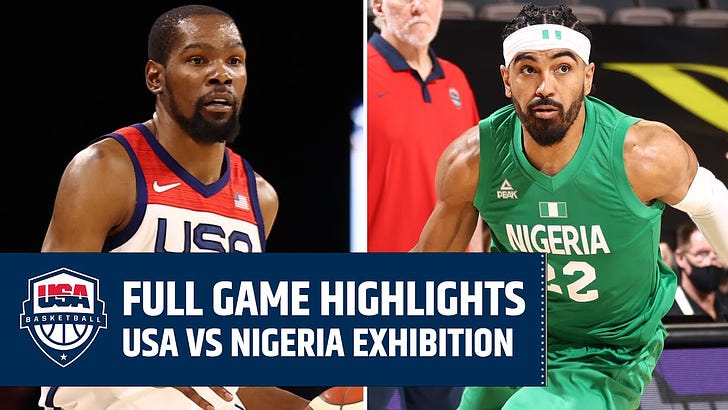Team USA Losing to Nigeria is a Good Thing for Basketball
This isn’t 1988 nor 2004. Think more 1992.
The men’s US Olympic basketball team losing a 90-87 decision Saturday to Nigeria caused a very rational reaction from hoops media and fans alike on social media — say nothing of the sadly predictable sprinkling of xenophobia and racism, but that’s another matter.
A common and less embarrassing response to the exhibition result drew parallels to the wildly disappointing 2004 Olympic squad. The Athens Games marked America’s first failure to win Gold since 1988. In both instances, loss prompted wholesale changes to USA Basketball’s approach.
Seoul provided the final impetus to spurn amateurs for inviting NBA players, the wheels of which were in motion a year earlier when Oscar Schmidt lit up America’s college stars for 47 points. Losing to the hated Soviets amid the backdrop of 1980s Red Scare resurgence further drove home the desire domestically to see the US reclaim its dominance.
The disappointment of 2004 arguably cut deeper after all-NBA rosters (save Christian Laettner and Emeka Okafor) claimed three straight Gold Medals, and the Athens roster featured future Hall of Famers Allen Iverson, Dwyane Wade, Carmelo Anthony, Tim Duncan and LeBron James.
The 2004 team was young: Wade, James and the present-day, all-time leading scorer in American international basketball history Anthony were coming off their rookie seasons and Amare Stoudemire had just two years of NBA experience.
Still, with Iverson and Duncan at their peaks and boasting three combined MVPs between them at that juncture, Team USA should have won Gold in Athens. At least, that’s the prevailing sentiment.
Signs of America’s basketball empire crumbling were evident four years earlier, however. The Sydney Olympic team is best known two decades later for Vince Carter’s historic dunk over Frederic Weis…
…but less remembered is that Team USA only beat France by 12 points that day. The Gold Medal Game rematch was a 10-point American win.
Before the final, the US won games against Lithuania by nine points, and sweated out a two-point victory in the semifinal rematch.
I remember hand-wringing at the time. American basketball fans who had grown accustomed to the first two NBA Olympic teams destroying all competition became greedy — insert your own joke about how the rest of the world views the United States in general — and the sudden resistance Team USA faced was deemed reflective of its failure. It couldn’t possibly be that Lithuanian — the state most responsible for making the ‘88 Soviet team a juggernaut — was actually good.
“Twelve guys would have had to change their identities,” Jason Kidd told the Los Angeles Times following the two-point, semifinal win over Lithuania. “We would have been moving as far away as possible. New Zealand would have been my pick. You guys [U.S. media] would probably help us find citizenship in a different country.”
While the 2000 and 2004 teams lacked the depth and overall quality of the Barcelona and Atlanta squads, those rosters marked a cosmic alignment, providing the perfect conditions for some of the 10-20 best players in history to play together.
But more pertinently, the rest of the world improved.
Nandor the Relentless wasn’t the only person — or in his case, undead creature of the night — influenced by the Dream Team.
The dominance of the Dream Team in 1992 and the wonder it commanded around the globe grew the game in an unprecedented way.
Basketball’s accelerated globalization after ‘92 had undeniably positive impacts on the game going well beyond international competition and still resonate today.
Fifteen years after the Dream Team, Dirk Nowitzki became the first truly international player to win Most Valuable Player (Canadian Steve Nash won back-to-back in the years prior, but came from the NCAA). That same season, French-born Tony Parker won Finals MVP.
In 2021, Nikola Jokic’s MVP marks the first from the pipeline of former Yugoslavian nations, and third straight won by a foreign national after Greece’s Giannis Antetokounmpo won two.
Three decades of NBA-led growth in Europe, which later spilled into China and the Oceanic, has moved into Africa over the last decade.
Despite having produced one of the greatest NBA players of all-time in that era, Hakeem Olajuwon, the continent was noteworthy in 1992 competition only for Charles Barkley throwing a vicious elbow in a blowout of Angola.
Nigeria’s exhibition win 29 years later speaks to the remarkable growth of basketball on the continent. The formation of NBA Africa, a movement led in part by 1996 Olympic team star Grant Hill, suggests the continent’s hoop potential is only barely being scratched at the surface.
The 2021 D’Tigers are not a Nigerian national team in the sense that it’s made up of players in Nigeria. On the contrary, most are American but have Nigerian lineage. The benchmark for inclusion on the team, which features eight current NBA players and a ninth in Ekpe Udoh who spent eight years in the league, is flexible — but not nearly as insane as professional snake-oil salesman Malcolm Gladwell’s preposterous definition.
Last week, I interviewed UNC-Wilmington guard Mike Okauru for a profile that will appear at FloHoops.com. Okauru was part of the 49-man workouts for a spot with the D’Tigers. The All-Colonial Athletic Association honoree marveled at the speed with which the bevy of NBA players at the workouts played.
That article, which will go live sometime before Team Nigeria officially opens Olympic play against Australia, explores how the Nigerian national team will benefit the American college game. On a grander scale, the perform of the D’Tigers in Tokyo could be the next major step in advancing basketball’s growth to largely uncharted territories.



